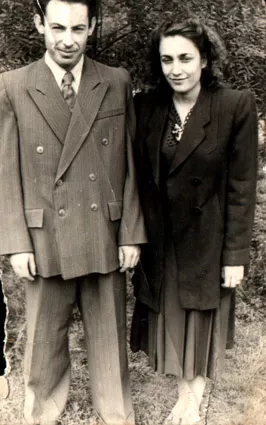I am having a walk with my wife Riva. We were photographed at my mother's request. She kept this photograph. This photo was taken in Mogilyov-Podolskiy in 1956.
In 1946 I quit school before finishing the 6th form. My mother managed to find me an employment as a clock repair man apprentice. I received a worker’s food card at work. The shop I worked in worked for NKVD employees. I had many friends after the WWII: my former classmates and my colleagues. We went to a gym together and in summer spent time on the Dnestr. I also met my future wife Riva Gershberg in this company of young people. Riva was the same age with me and came from Mogilyov-Podolskiy. In 1945 Riva went to work as a lab assistant at the buttery. She also studied in an evening school. The school was far from her house. I met Riva near her school after classes and accompanied her home. I met Riva's family and they liked me. In 1949 we got married. Riva's mother was an atheist while my mother became religious during the war. My mother insisted that Riva and I had a traditional Jewish wedding. The synagogue did not operate after the war, but there was secret prayer house. The rabbi lived across the street from our house. He often came by asking me to fix household things for him. He was a very nice and intelligent man and we often had interesting discussions. Riva and I had a civil ceremony in the district registry office, but lived at our homes for a whole month before the Jewish wedding.. I made my wife a wedding ring from a silver spoon. We had a chuppah installed in the yard. My mother invited the rabbi to conduct the wedding ceremony. After the wedding Riva moved in with us.
In 1951 I was recruited to the army. I passed the military commission in the military registry office and was sent to an Air Force unit as a gunman. I went to a military school in Poltava [250 km from Kiev]. However, they had already completed the department of gunmen and I was not admitted. I was sent to the school for motor mechanics in Poltava, but later the school moved to Mirgorod [about 300 km from Kiev]. I joined Komsomol at school. I finished the school with honors in 1952. For excellent finishing school and support of my fellow students I was allowed a leave. I spent it with my wife at home, of course. She was pregnant and the baby was due soon. On 11 January 1952 I got news from home that I had a son and on 13 January I took my military oath. We named our son Igor. My wife quit her evening school. I insisted that she did. 9 forms at school are sufficient for a housewife, and I didn't want my wife to ever go to work. I believed I was capable of providing for the family, and a wife is to be a good housewife, mother and a family guardian.
I got another leave in 1954. My son was 2 years old. I spent a month with my wife and son and was happy. The last year of my service was in Germany, at an Air Force aerodrome in a little town near the Eastern Berlin. I was an electric mechanic there. A year later I demobilized and returned home on 12 November 1955. On 7 December I went to work at the food industry equipment plant in Mogilyov-Podolskiy and worked there 46 years. I started as a laborer, then I worked as a tinsmith and a mechanic. I joined the party in 1958. I also passed exams for the 6th form of school and went to the 7th form. I always liked to study and had all excellent marks at school, though I was always pressed for time. After finishing school I wanted to go on studying. In 1960 the plant sent me to study in Moscow extramural all-Union machine tool College. My wife was pregnant. My younger son Mikhail was born in 1961. My wife and I were atheists and did not observe any Jewish traditions, including circumcision.
My younger son Mikhail was born in 1961. My sons were raised like all Soviet children. They became young Octobrists, pioneers and then joined Komsomol at school. We didn't celebrate Jewish holidays, but we celebrated Soviet holidays at home and at work. We had guests at home. On 1 May and 7 November my wife and sons and I went to parades with other employees of the plant. On Victory Day, 9 May, we went to the meeting with veterans of the war on bank of the Dnestr, near the tank that was the first to enter Mogilyov-Podolskiy on 19 March 1944. We also celebrated New Year and family birthdays. We usually spent family vacations at the seashore in the south. We sometimes bought tours or just rented rooms there.





















